Ella's story, as told by her father
“ She was like a ball of energy, with no concept of sitting still.”
The idea of us having children snuck up on us really. My wife and I had been together for 13 years and decided to adopt about three years ago. Our local adoption service said we were good candidates but, looking back, it was a bit of a shock to the system. We adopted a five-year-old little girl called Ella and I think I was expecting her to be a placid, quiet child – someone we’d have to bring out of a corner by being good parents. Actually, she was a ball of energy. She was extremely energetic and couldn’t stop moving. If she was supposed to be standing still, she’d be walking. If she had to walk,she’d be running. If I had to describe her, she was like a feral kitten.
“ Her behaviour suddenly deteriorated rapidly.”
After many months, we realised there were some serious problems being masked – for Ella and for us. In kindergarten and at home her behaviour suddenly deteriorated rapidly. She became quite violent and most days there would be threats to kill. She’d also threaten to run away. There she was, at six years old, stood at the door with her bags packed.
“ We’d fallen absolutely in love with her, so there was nothing we wouldn’t do.”
It had become very tough to cope with the underlying violence though. That was exhausting for us, but it was clear that it wasn’t good for her either. One day she was curled up in a foetal position on her bed and said to me “I think my brain is broken.” Simple words, but we realised we had to get professional help to deal with it. We negotiated with social workers and went to see the adoption service. We spoke to the family doctor too and were referred to the Maudsley for an assessment, where they recommended an intense programme of family therapy to cope with the immediate symptoms. We started parent-child game sessions, where you’re in a room with your child and a Maudsley team member instructs you through an earpiece on how to play and deal with certain behaviours. It’s a special type of play that helps a child feel appreciated. You constantly praise the good behaviour and ignore the bad behaviour. It’s a really simple process, but really well thought through.
“ The team took us in hand and we saw results immediately.”
It also distilled in us the confidence to be disciplinarians. It showed us that she’d love us all the more for showing her firm guidance, because underneath it all she was a child that was really lost. We’d watched her spin out of control and the Maudsley team took us in hand and showed us what to do. They commended us for what we were doing right; the things that came naturally, but they also encouraged us to try 19 CAMHS National and Specialist Services: Adoption and Fostering Service out new techniques around the things that didn’t come so naturally. It was amazing to learn about the power of not responding to certain behaviours. It seems so simple, but the techniques affected her behaviour in such a positive way. We weren’t nagging or shouting. Changing our behaviour became the first step in changing hers. I’d been at my wit’s end before we got to the Maudsley and the sessions helped, definitely. I’m glad I stuck with them.
“ The play sessions helped me to bond too.”
I hadn’t been able to bond with Ella very well and the sessions helped her to become more comfortable with me and allowed our friendship to grow. First we dealt with the good behaviour and then tackled the more difficult things. I felt a bit like an F1 driver getting information from the pits. ‘We’re going to engineer a temper tantrum’, they’d say, and then they’d give me ways to manoeuvre around the corners and get her back on track – techniques we could take home with us. Because the sessions had such a positive result, the Maudsley team were also able to detect other underlying issues.
“ The Maudsley team uncovered her ADHD.”
The constant motion that existed beyond the misbehaviour was a clue really. But, the attention deficit hyperactivity disorder (ADHD) diagnosis started us on a brand new phase and brought about a bigger decision; whether we should trial medication. I didn’t want it at first because I’d heard lots of horror stories, but we were able to talk through the options, and the fact that she wasn’t happy at school clinched it for me. It was miraculous – I can’t really describe it as anything else. The teachers were amazed to see the change too. On the second day after starting the medication, she arrived home and said “I didn’t get into trouble at school today, Dad.” I always walk her there every morning and she used to only say a few words on the way. Now she wouldn’t stop talking!
“ Four weeks later, she was presented with a gold certificate and pencil for being the most improved pupil.”
In fact, what we’ve been able to do is keep the medication at a small dosage so it helps her at school but she’s free of it by the time she gets home. And she’s only on it five days a week. The combination of treatment and medication has had such a drastic effect. The discipline at school was obviously so difficult for her and she really never wanted to misbehave. It’s worth stressing that. I don’t think children want to misbehave, and I’d also stress to other families who are going through similar experiences that these kinds of difficulties are beatable. The team at the Maudsley train you to beat the problems yourself. And that’s very empowering.
